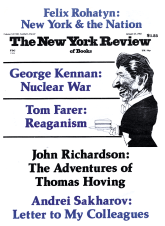In response to:
The Hunger Strikers from the October 22, 1981 issue
To the Editors:
Denis Donoghue’s characteristically sensitive plea for a new “discourse” on the hunger strikes in the Maze Prison [NYR, October 22] is a welcome break with the usual rhetoric on the subject. But it may itself be restricted.
More than having “rarely achieved their immediate object,” hunger strikes in twentieth-century Ireland have a record of complete and absolute failure. Moreover, the demonstrations were if anything even more dramatic than his essay suggests. McSwiney’s fast in 1920 was carried out in London amid news of an eight-member fast in Cork that had begun two days earlier. Perhaps McSwiney “gave Republicans a weapon they already knew how to use,” but the following year an irate salesman named Brosnan sued the Irish Art Association of Pawtucket, Rhode Island, because his consignment of Terry McSwiney statutes would not sell, and the only commemoration of McSwiney’s “moral advantage” known to me is evocation of his name in Samuel Beckett’s Malone Dies as an example of longevity. It should also be noted that after “Jack” McNeela and “Tony” d’Arcy starved themselves in 1940 their four fellow hunger strikers decided to abandon their action.
Despite the…attention given the demonstration in the Maze, it has not often been noted that successful hunger strikes have recently been carried out by PLO prisoners in Israel, inmates in Paraguay, and relatives of interned men in Chile. Their success was due to the direct connection between their tactic, self-imposed hunger, and their cause, prison reform. The same is true of the example of Gandhi, before whom hunger strikes were employed only as sideshow entertainments or rather eccentric medical experiments (pace Yeats).
However, I am entirely in sympathy with the recommendations of Professor Donoghue’s essay, and these comments are only offered as an effort to “keep up the talk of an admittedly limited good sense.”
John P. Harrington
Rutgers University
New Brunswick, New Jersey
Denis Donoghue replies:
I agree with Professor Harrington in the general tendency of his letter, but as a matter of fact, IRA hunger strikes have sometimes been successful, especially in the years up to 1940; successful in the sense that the strikers secured their release from jail. In 1939, for instance, Charles McCarthy was released in October, Jeremiah Daly in November, and Patrick McGrath in December. December 1939 was a turning point. A few days before Christmas, the IRA brought off a daring raid on the Irish Army’s Magazine Fort in Phoenix Park, Dublin, and seized a large quantity of ammunition. Much of the ammunition was soon recovered, but the government was so outraged by the raid that it immediately decided the IRA must be crushed. The Emergency Powers Act was enacted early in 1940 and the government warned that the hunger strike weapon would no longer be successful. (In 1946, by the way, the IRA prisoner Davy Flemming effected his release from jail in Northern Ireland by going on hunger strike.) The books to read on this matter are by Tim Pat Coogan: his The IRA (1970, revised 1980) and On The Blanket (1980).
This Issue
January 21, 1982



